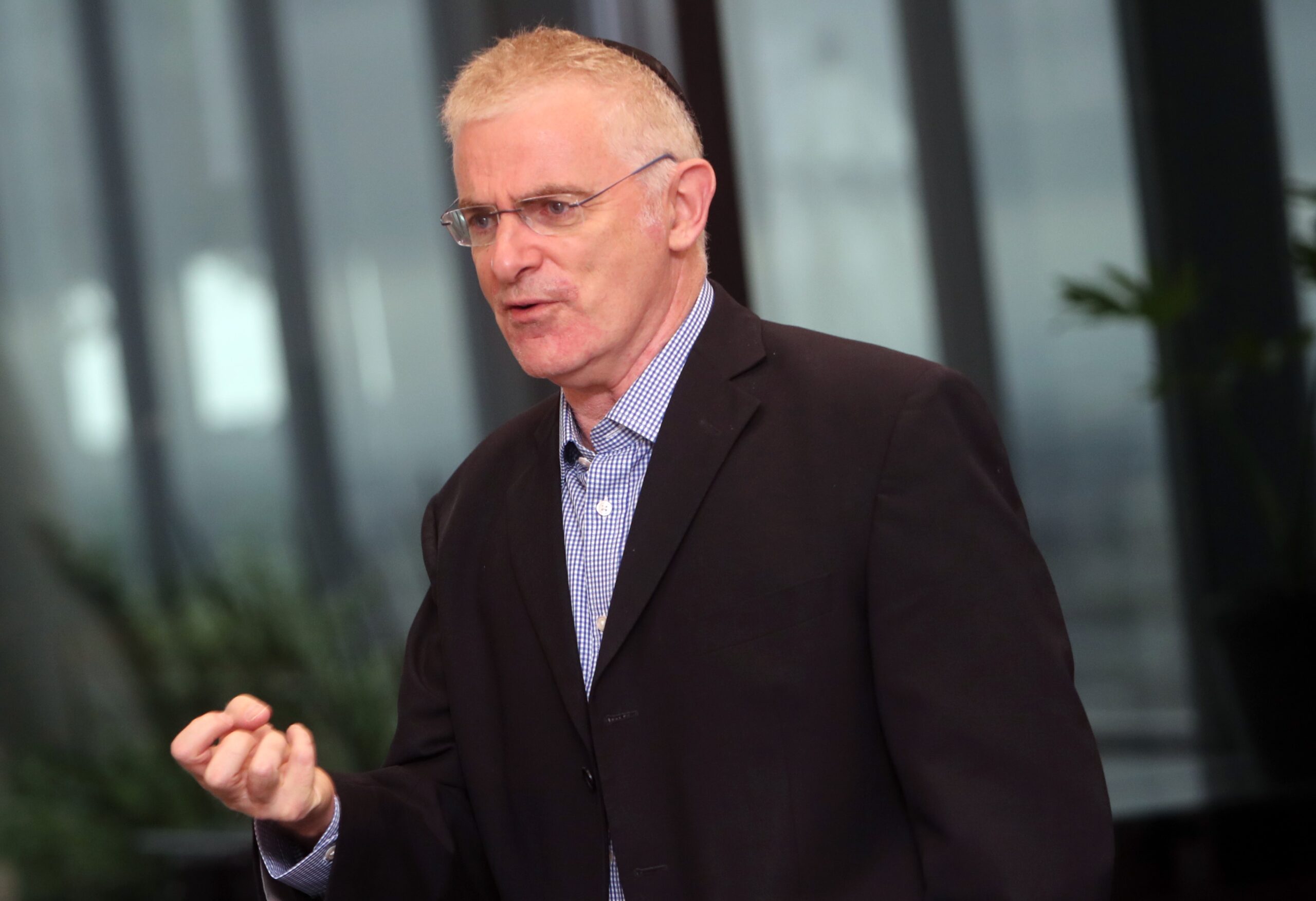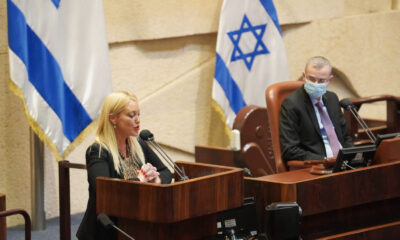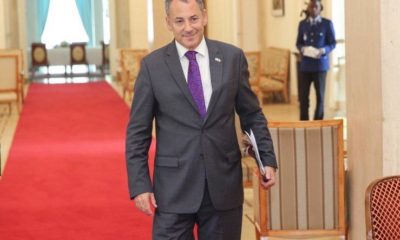
Israel

War and peace – Israel’s hard choices
“No-one imagined that the worst pogrom against the Jewish people since the Holocaust would happen in Israel, the place Jews are meant to come to feel safe,” says Israeli diplomat and international lawyer Daniel Taub.
However, he has noticed a strange irony to this tragedy, namely that “nobody I know in Israel wants to leave”. In fact, Israelis have been returning in droves since 7 October, both for reserve duty or simply to be there, “because in a crisis, you want to be with family. It’s striking that on the eve of this war, Israel was more divided than it’s been in its history. It’s currently extraordinarily united.”
Taub himself was hesitant to leave the country. But in the end, he made a whirlwind trip to Cape Town in late February to meet politicians, the media, and the community, to share what Israel is going through and to shed light on the facts of its war against Hamas.
Taub, who served as Israel’s ambassador to the United Kingdom from 2011 to 2015, told the SA Jewish Report, “This was a war we didn’t expect, a war we didn’t want, yet it’s a war we have no choice but to fight. One of the tests of failure is whether the 200 000 Israelis who have been evacuated from the north and south feel comfortable going back to their homes. Because if not, Iran and its proxies would have succeeded in shrinking the state of Israel, and that’s not something we can afford.”
He reflects on how 7 October could have happened. “A lot of people are thinking back 50 years, to the last time we had what’s called a conceptia in Hebrew – a fixed paradigm of thinking that turns out to be tragically wrong.” He’s referring to the Yom Kippur War, which broke out 50 years and one day before 7 October 2023. “In this case, we didn’t have just one conceptia here, we had a number that proved to be catastrophic – in terms of intelligence; assumptions about what Hamas wanted; military preparedness; and so on. But, alongside those catastrophic failures, there have also been some extraordinary achievements.
“For example, when you speak to military experts, they recognise that the environment in which we’re fighting is possibly the most complex field of combat. Particularly people who have experienced combat in Afghanistan, Iraq, and so on, have been so impressed with what Israel has been able to achieve in confronting infrastructure that’s been built over 16 years and the degree to which Israel has been able to limit collateral damage.
“We’ve seen other things that have been remarkable that we hadn’t expected, such as the unexpected heroism of our younger generation. What country, when war breaks out, has planes coming in filled with young people returning to fight, with 130% turnout for reserve duty? The wives of these young men, the families that have supported them, and the whole society coming together has been unprecedented.”
Regarding Israel being accused of genocide, Taub said that any critical thinker should start off with the simplest question, namely, for which side in this conflict is every casualty a success, and for which side is it a failure? “Israel not only regards every civilian casualty as a tragedy, but its precautionary measures increase the risks to its own soldiers,” he said. “Israel’s ground incursion into Gaza was delayed by three weeks precisely to allow for evacuation, even though it was clear that this would allow Hamas leadership to escape and for the movement of hostages and weaponry.”
Meanwhile, “a good litmus test for judging credibility on this issue is to look at what was said between 7 and 10 October, before Israel had any military response whatsoever”, Taub said. “We already had South African leadership blaming Israel.
“We know that South Africa has protected perpetrators of genocide in relation to Darfur. So many core elements, as we saw in the South African application to the International Court of Justice [ICJ], made no reference to hostages, to the Hamas attack, to Israel pulling out of the Gaza Strip in the first place, to repeated efforts for peace. You have to play so fast and loose with history to try advance this theory [of genocide].
“One of the striking things is the effort made by South African leadership and the media to portray the preliminary ICJ decision as a victory,” he said. “Nowhere in the decision does it come close to saying that Israel is plausibly committing genocide. The fundamental request of the South African government was to tie Israel’s hands. Yet every judge unanimously made it clear that Israel had the right to defend itself.
“I hope that somebody in South Africa is asking, ‘Has this helped the Palestinian people of Gaza?’ because from the outside, it looks like it’s just putting wind in the sails of the terrorist organisations destroying Palestinians’ lives. And if South African leadership has such respect for the court, where is its voice calling for the unconditional release of the hostages in line with the ICJ’s ruling?
“It’s clear that the leadership in South Africa has a close relationship with Iran,” he said.
Regarding “the day after the war”, Taub said, “The less that Hamas is seen to have had any kind of success, the more likely it is that we’ll be able to create a sustainable, secure relationship between Israel and Gaza.”
He feels that the unprecedented situation of having hostages in captivity means that “mentally and emotionally, we’re still locked in 7 October. It’s sometimes portrayed that two of the core goals of this war – defeating Hamas and releasing the hostages – are in opposition to each other. But if we look at the previous release of hostages, we’ve seen that it was military pressure on Hamas that created an environment in which that deal was possible.”
Turning to Israel’s northern border, he said, “In many ways, the northern border is a greater security threat to Israel. Hezbollah is better armed and it’s ‘war tested’. It has 150 000 missiles that are far more precise than Hamas missiles.”
As for the possibility of a two-state solution, he said, “A state isn’t just a title, it’s a set of responsibilities – like educating your kids not to aspire to jihad; and exerting responsibility over rogue terrorist groups. How does creating a state address those core issues?
“There’s one thing worse than not having a solution and that’s thinking that you have a solution when you don’t,” he said. “Peace is the work of a generation, and we’re not doing anybody a favour by thinking that there’s a shortcut. That doesn’t mean that we can’t start. It’s a long, painful project, and we need the help of the international community.”
He emphasised that the younger generation in the diaspora is growing up in a world that hates Israel, and it needs to be given all the support it can get in dealing with it.
Finally, he expressed his appreciation for the South Africa Jewish community, which is known for being very close to Israel. “It’s something that we feel, particularly at this time,” he said.









Ian J
February 29, 2024 at 4:09 pm
That is just not true, there is a growing movement of Israelis who have decided to leave.
https://danielgordis.substack.com/p/with-great-sorrow-weve-chosen-to